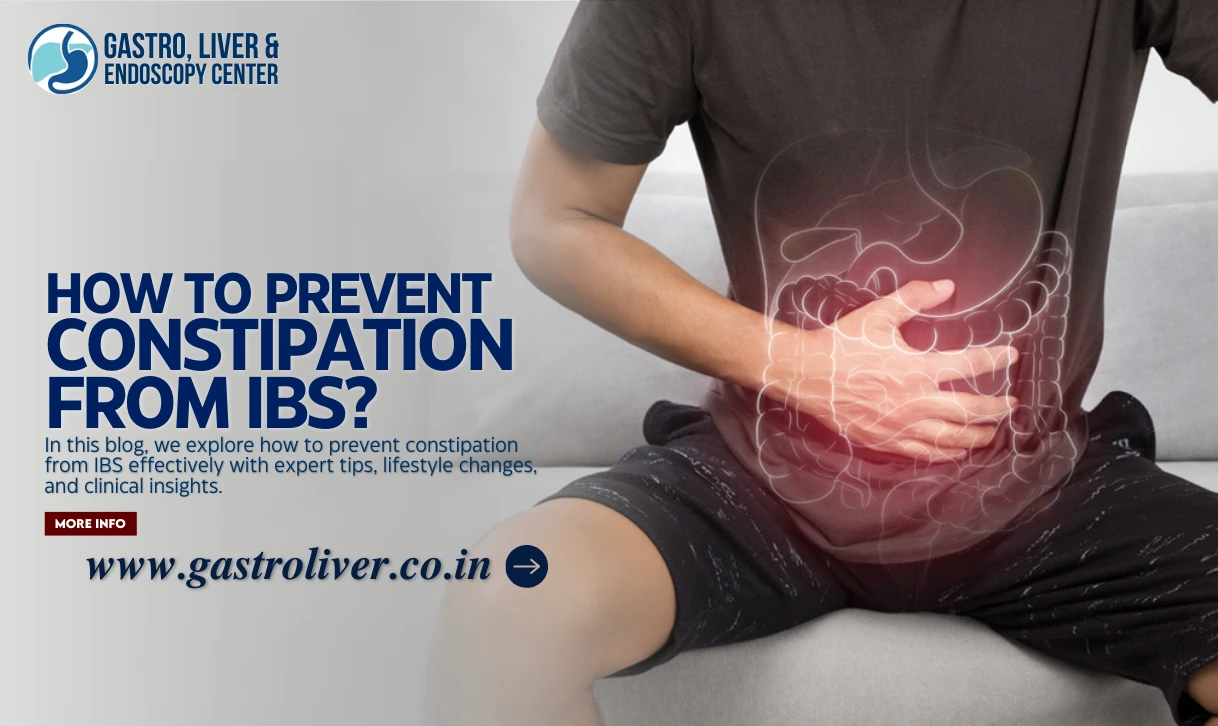How to Prevent Constipation from IBS?
Irritable Bowel Syndrome (IBS) is a common digestive disorder that affects millions worldwide. Among its three types — IBS with constipation (IBS-C), IBS with diarrhea (IBS-D), and mixed IBS (IBS-M) — IBS-C or constipation-predominant IBS. can significantly affect quality of life. Chronic discomfort, bloating, and irregular bowel habits are just a few symptoms patients struggle with.
At Gastro, Liver & Endoscopy Center, under the expert guidance of Dr. Manish Kumar Gupta, a Top Gastroenterologist in Noida and Ghaziabad, we help patients identify manageable strategies for long-term relief. In this blog, we explore how to prevent constipation from IBS effectively with expert tips, lifestyle changes, and clinical insights.
Understanding IBS-C: What Causes It?:
IBS-C is primarily a functional bowel disorder, meaning there's no visible disease on diagnostic tests, but the intestines don’t function properly. The main features of IBS-C include:
- Infrequent bowel movements (fewer than 3 per week)
- Hard, lumpy stools
- Straining during bowel movements
- Bloating and abdominal discomfort
Some key triggers include:
- Low-fiber diets
- Stress and anxiety
- Poor hydration
- Hormonal changes
- Disrupted gut-brain communication
How to Prevent Constipation from IBS?
1. Increase Dietary Fiber (Cautiously):
Fiber adds bulk and softens stool, helping it pass more easily. However, IBS patients must introduce fiber gradually to avoid worsening bloating or gas.
Soluble fiber (psyllium, oats, flaxseeds, chia seeds) is usually better tolerated than insoluble fiber (bran, raw vegetables).
- Start with small amounts and increase over weeks.
- Avoid processed fiber supplements unless recommended by your doctor.
Dr. Manish Kumar Gupta, a Best Gastro Doctor in Noida, often advises a low FODMAP diet initially, then slowly reintroducing fiber-rich foods under supervision.
2. Stay Hydrated:
Water is essential for moving fiber through your digestive tract. Dehydration can make constipation worse.
- Aim for 8-10 glasses of water per day.
- Warm fluids (like herbal teas or warm lemon water) in the morning can stimulate bowel movements.
- Limit caffeinated and sugary drinks that may worsen IBS symptoms.
3. Follow a Consistent Meal Routine:
Regular eating times promote consistent digestion.
- Eat smaller, balanced meals throughout the day.
- Avoid skipping meals or eating large portions at once.
- Avoid heavy or late-night meals.
Gastro, Liver & Endoscopy Center, known as the Best Endoscopy Centre in Noida, often educates patients about the importance of gut-friendly nutrition planning.
4. Limit IBS Triggers (FODMAPs, Dairy, Gluten):
Many IBS patients are sensitive to certain carbohydrates known as FODMAPs (Fermentable Oligo-, Di-, Mono-saccharides and Polyols).
- Common offenders: garlic, onion, beans, wheat, milk, apples, and artificial sweeteners like sorbitol.
- Try a low-FODMAP elimination diet with professional guidance.
Dr. Manish Kumar Gupta, a Top Gastroenterologist in Ghaziabad, customizes dietary plans based on individual intolerance.
5. Incorporate Gentle Physical Activity:
Exercise stimulates gut motility and can ease constipation.
- Aim for 30 minutes of moderate movement (walking, yoga, cycling) 5 times a week.
- Avoid prolonged sitting.
- Gentle core-strengthening exercises can support better bowel movement control.
6. Manage Stress and Anxiety:
Stress is a major trigger for IBS flares. The gut and brain are deeply interconnected via the gut-brain axis. Effective techniques include:
- Mindfulness meditation
- Breathing exercises
- Cognitive-behavioral therapy (CBT)
- Adequate sleep
Gastro, Liver & Endoscopy Center integrates holistic care to address both physical and emotional triggers of IBS-C.
7. Avoid Overuse of Laxatives:
Though tempting, frequent use of over-the-counter laxatives can worsen IBS over time. They can lead to dependency and disrupt natural bowel function. Instead, consider:
- Prescription medications like lubiprostone, linaclotide, or plecanatide (under doctor’s supervision)
- Probiotics to improve gut flora
- Natural remedies like prune juice, aloe vera juice, or magnesium citrate (after consulting a gastroenterologist)
8. Consult a Gastroenterologist Regularly:
Chronic constipation may indicate a more serious underlying issue like:
- Colonic inertia
- Pelvic floor dysfunction
- Hypothyroidism
- Colorectal obstruction
At Gastro, Liver & Endoscopy Center, our team uses advanced endoscopy and diagnostic tests to rule out structural or functional abnormalities. Recognized as the Best Endoscopy Centre in Noida, we combine technology with compassionate care.
When to Seek Medical Attention?:
Reach out to a Top Gastroenterologist in Noida or Ghaziabad if you experience:
- Persistent constipation lasting more than 3 weeks
- Blood in stools
- Unexplained weight loss
- Severe abdominal pain
- Incomplete evacuation
Dr. Manish Kumar Gupta, with years of experience and a patient-centric approach, is one of the Best Gastroenterologists in Ghaziabad and Noida for IBS treatment.
FAQs:
1. Can IBS cause daily constipation?
Yes. IBS-C can lead to persistent or fluctuating constipation, often accompanied by bloating and discomfort. A Top Gastroenterologist in Noida, like Dr. Manish Kumar Gupta, can help tailor a management plan.
2. What is the best diet for IBS-C?
A low-FODMAP diet with gradual fiber reintroduction, plenty of fluids, and avoiding trigger foods like gluten or lactose can be effective. Consult with a nutritionist or gastroenterologist before major dietary changes.
3. Are probiotics helpful in IBS-C?
Certain probiotics (e.g., Bifidobacterium infantis) may help regulate bowel movements and reduce bloating. However, results vary, and a Best Gastro Doctor in Noida can help select the right supplement.
4. Is constipation in IBS dangerous?
Though not life-threatening, chronic constipation can cause hemorrhoids, anal fissures, and discomfort. Always consult a specialist to rule out other causes.
5. Can exercise really help with IBS-C?
Yes. Moderate daily exercise improves gut motility, reduces stress, and can significantly ease symptoms of IBS-C.
6. How often should I see a gastroenterologist for IBS?
If symptoms persist despite lifestyle changes or worsen over time, regular follow-ups every 3–6 months are recommended with a Top Gastroenterologist in Ghaziabad or Noida.
7. What if nothing works for my constipation?
If standard treatments fail, Gastro, Liver & Endoscopy Center offers advanced diagnostics and medications for refractory IBS-C cases. You might also be evaluated for overlapping conditions like pelvic floor dysfunction.

